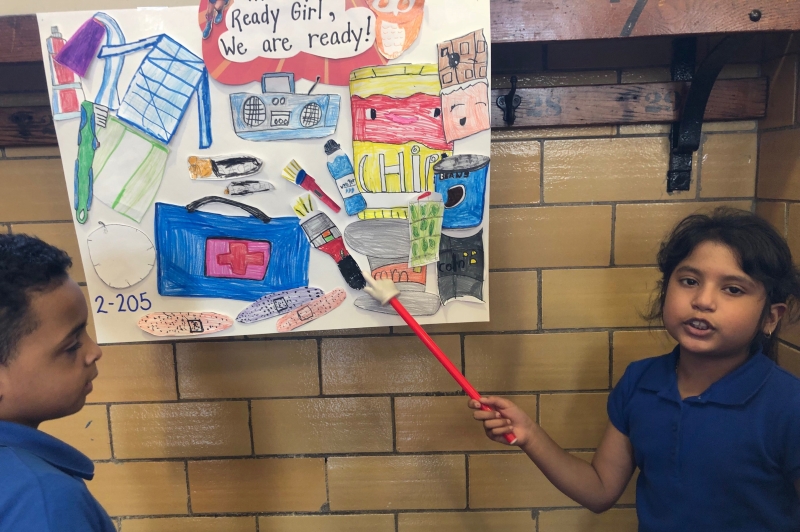
 Emergency Management311
Emergency Management311 Search all NYC.gov websites
Search all NYC.gov websites
Kids

Include your children in planning for an emergency. Teach them how to get help and what to do in different situations. Practice your household disaster plan with your children and quiz them about preparedness information.
What Every Child Should Know
- Family name, address and phone number, and know where to meet in case of an emergency. Children too small to memorize this could carry a small index card that lists emergency information. You could clip it to their shirt or place it in a pocket.
- Family contact information for use in an emergency.
- Never to touch wires lying on the ground or hanging from poles.
- How to identify the smell of gas. Tell them that if they smell it, they should tell a grown-up or leave the building.
- How and when to call 911.
Information About Your Child's School or Day Care Facility
- Find out what your child's school does in the event of an emergency and know the school's emergency plans.
- Find out where can you pick up your child during an evacuation.
- Ensure that the school has up-to-date contact information for you and at least one other relative or friend.
- Find out if you can authorize a friend or relative to pick up your children in an emergency if you cannot.
Pack a Go Bag
Pack child care supplies as well as games and small toys in your family's Go Bag. Include items that can help protect you and others from COVID-19, including hand sanitizer, and face coverings for each person.* (*Face coverings should not be used by children under the age of 2. They also should not be used by people having trouble breathing, or who are unconscious, incapacitated, or unable to remove the mask without assistance. Learn more from the Centers for Disease Control and Prevention (CDC))
Reassurance
While disasters may cause apprehension for adults, they often affect children more seriously. Children may grow uneasy when they don't know what to expect. They may be especially upset if they have to leave their home and daily routine. You can help children cope by understanding what causes their anxieties and fears. Reassure them with firmness and love.
Consider the following tips to help children better cope with disaster:
- Children are particularly vulnerable to emotional stress after a disaster and may exhibit excessive fear of the dark, crying, fear of being alone and constant worry. Reassure children that they are safe.
- Encourage them to talk about their fears, emphasize that they are not responsible for what happened, and comfort them.
- Before and during an emergency, make sure that at least one adult will be with children.
- Give children guidance that will help them reduce their fears. Children depend on daily routines. They wake up, eat breakfast, go to school, and play with friends. When emergencies or disasters interrupt this routine, children may become anxious, confused, or frightened. They'll look to you and other adults for help.
- How you react to an emergency gives children clues on how to act. If you react with alarm, a child may become more scared. They see fear as proof that the danger is real. If you seem overcome with a sense of loss, a child may feel their losses more strongly. Children's fears also may stem from their imagination, and you should take these feelings seriously. A child who feels afraid is afraid.
- Your words and actions can provide reassurance. When talking with your child, present a realistic picture that is both honest and manageable. Feelings of fear are healthy and natural for adults and children. As an adult, you need to concentrate on your child's emotional needs by asking the child what's uppermost in his or her mind. Be aware that in an emergency, children are most afraid that someone will be injured or killed, they will be separated from the family, or they will be left alone.
- Calmly and firmly explain the situation. As best as you can, tell children what you know about a potential disaster. Explain what will happen next. For example, say, "Tonight, we will all stay together in the shelter." Get down to the child's eye level and talk to him or her.
- Encourage children to talk. Let children talk about the disaster and ask as many questions as they want. Encourage children to describe what they're feeling. Listen to what they say. If possible, include the entire family in the discussion.
More Resources
- Ready New York for Kids guides
- Ready Girl
- Ready New York: Choose Your Own Path to Preparedness guides for tweens
- Ready Kids (FEMA)
- Download the FEMA Earthquake Preparedness Guide for Children in English (FEMA)
- Download the FEMA Earthquake Preparedness Guide for Children in Spanish (FEMA)
- Ready Sesame Workshop (Sesame Street)
- Emergency Preparedness for Individuals ↦ Families (NYC Department of Health & Mental Hygiene)
- "Coping With Traumatic Events" (NYC Department of Health & Mental Hygiene)
- "Helping Children Cope With Disaster" (FEMA and the American Red Cross)
- Play a game with Sparky the Fire Dog
- Play games at Con Edison for Kids online
- Visit the READY Classroom for teachers


